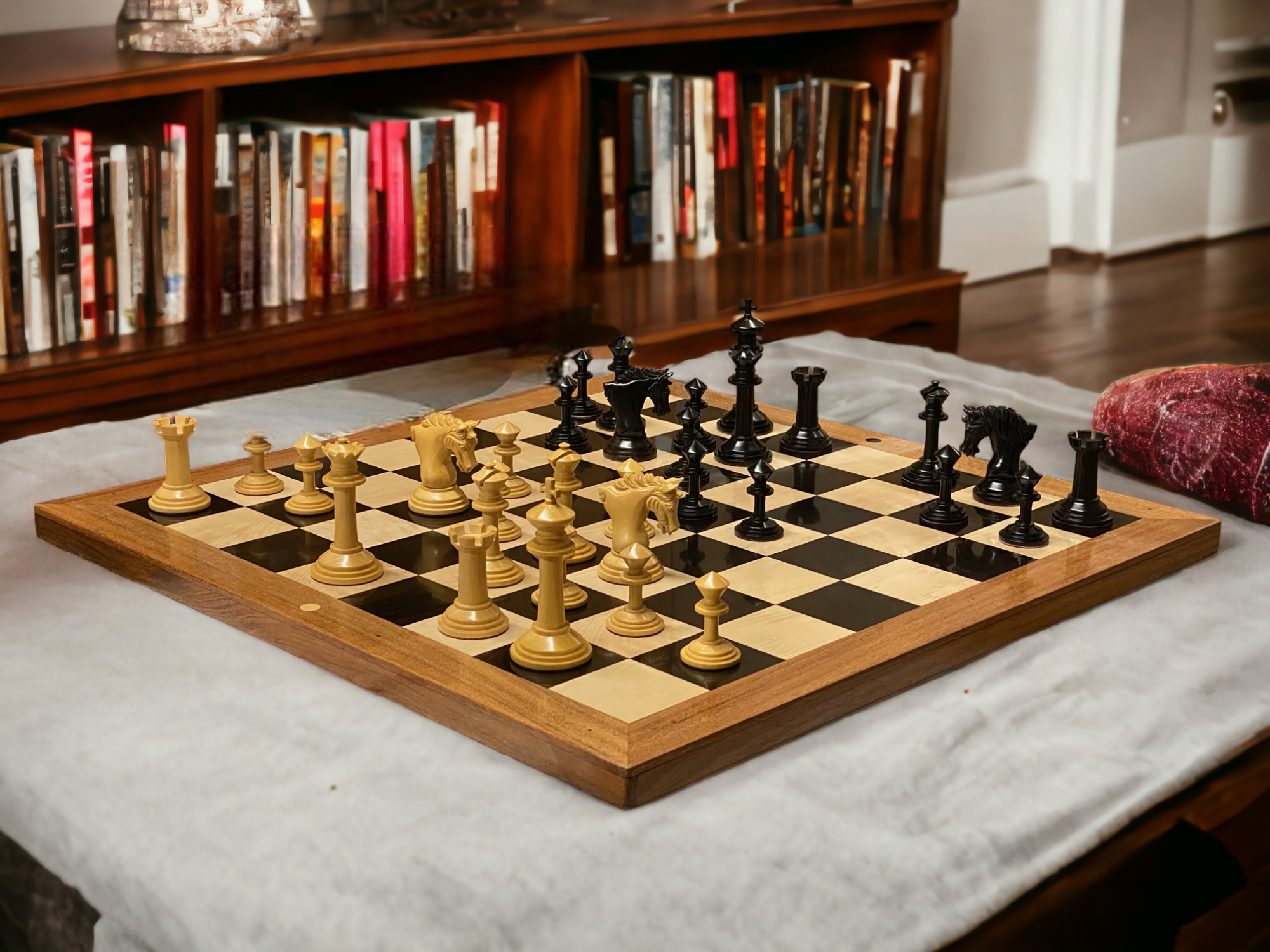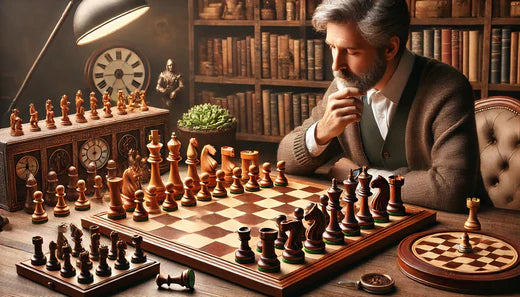Chess, often referred to as the game of kings, is more than just a pastime; it’s a cognitive battlefield that hones your analytical, strategic, and critical thinking skills. Whether you are a novice hoping to become a grandmaster or an enthusiast who enjoys the elegance of British Ebonised Chess Pieces, understanding the science behind chess training can substantially enhance your performance. In this article, we will delve deep into the nuances of chess improvement, explore various training techniques, and break down the psychology that contributes to a player’s success.
The Importance of Training in Chess
Much like any other skill-based activity, training is crucial in chess. Players at all levels benefit from dedicated practice, as it not only solidifies existing knowledge but also introduces new strategies and concepts. Here are the main reasons why training is essential:
- Skill Development: Continuous practice allows players to develop and refine their skills over time.
- Pattern Recognition: Training exposes players to various positions and strategies, improving their ability to recognise patterns in games.
- Emotional Control: Regularly engaging in competitive scenarios helps players become more accustomed to the emotional highs and lows of chess.
- Strategic Thinking: Training helps you cultivate a more profound understanding of strategic principles, enabling better decision-making during games.
Understanding Cognitive Psychology in Chess
At its core, chess is a mental game that engages multiple cognitive faculties. Psychological research has shed light on how the brain functions during play, and how players can leverage this knowledge to improve. Key aspects of cognitive psychology that affect chess training include:
Memory and Recall
One of the pivotal skills in chess is memory. Successful players have an extensive repertoire of openings, tactics, and endgame strategies stored in their memory. Practicing these elements consistently improves recall and application during games. Techniques to enhance memory include:
- Chunking: Breaking down complex positions into smaller, manageable parts makes it easier to remember.
- Imagery: Visualising boards and moves helps create a mental image that enhances memory retention.
- Repetition: Regularly practicing known openings or positions reinforces memory through repetition.
Attention and Focus
Chess requires sustained attention and concentration, which can significantly influence performance. Training can help improve a player’s focus through:
- Mindfulness: Practicing mindfulness techniques can enhance focus during critical moments in a game.
- Simulated Stress: Playing under timed conditions or in tournament-like settings can prepare the mind for real-game pressure.
Effective Training Techniques
Knowing how the brain functions can inform practical training strategies. Here are some effective techniques that players can incorporate into their training regimen to maximise improvement:
Regular Play Against Varying Opponents
Engaging with players of different skill levels exposes you to a wide range of playing styles and tactics. This will help you adapt and learn from others, thus broadening your strategies. Finding opponents to practice with, whether online or in-person, can provide invaluable experience.
Analyzing Your Games
Post-game analysis is integral to understanding your strengths and weaknesses. By reviewing your games, especially the losses, you can identify mistakes and areas for improvement. Consider using tools and resources online that offer game analysis features which can provide insights into alternative moves and strategies.
Utilising Chess Puzzles
Incorporating chess puzzles into your training routine boosts tactical awareness and problem-solving skills. Regularly solving puzzles helps develop your ability to quickly recognise patterns and tactics during an actual game. Websites and apps often provide daily puzzles to challenge players and sharpen their skills.
Studying Chess Strategies and Theory
Chess theory is vast, encompassing openings, middlegames, and endgames. Dedicate time to study various strategies, especially those that focus on the specific roles of different pieces, including the royal elegance of British Ebonised Chess Pieces. Resources like books, videos, and online courses can significantly deepen your understanding.
The Role of Personal Reflection
Chess is as much about self-awareness as it is about strategy. Personal reflection can help you assess not only your playing style but also your mindset during games. Here are some methods to encourage personal reflection:
- Journaling: Keeping a chess journal to record thoughts about your games can illuminate trends in your behaviour and thought processes.
- Mental Health: Maintaining mental resilience helps in coping with setbacks and learning from them, enhancing long-term growth.
The Impact of Environment on Training
Your training environment can significantly influence your concentration levels and overall effectiveness. Creating a conducive environment is key to maximising your training sessions. Here are some strategies to improve your training space:
Minimise Distractions
Ensure your training space is free from disturbances. This might mean turning off notifications on your devices or choosing a quiet room free from interruptions. A distraction-free setting can facilitate deeper focus, which is essential for effective learning.
Visual Aids and Learning Tools
Using visual aids, such as diagrams and annotated games, can enhance the learning experience. Consider employing teaching tools that break down complex ideas into simpler components, making them easier to understand and absorb.
Incorporating Technology into Your Training
In today’s digital age, technology can be a powerful ally in your quest to become a better chess player. Here are some ways to incorporate technology into your training regimen:
Chess Software and Apps
There are numerous chess software tools and mobile applications designed to assist players in their training. From analysis features to puzzles and tutorials, these resources can provide endless opportunities to improve your game.
Online Coaching and Community
Joining online chess communities and engaging with coaches can open doors to new insights and levels of understanding. Real-time feedback from experienced players can be invaluable in recognising and rectifying mistakes.
The Power of the British Ebonised Chess Pieces
While improving your skills, it is essential to enjoy the aesthetic and tactile experience of the game. British Ebonised Chess Pieces offer a striking visual contrast and a feeling of elegance that enhances the gameplay. The weight and feel of well-crafted pieces can not only inspire better concentration but also provide a deeper connection with the game.
Embrace the Wooden Aesthetic
Many players believe that using high-quality chess pieces can influence performance. The classic design of British Ebonised Chess Pieces embodies sophistication while representing a commitment to a serious approach to the game. It’s about having the right tools to make your experience enjoyable and fulfilling.
Connecting with the Chess Community
Lastly, don’t underestimate the importance of being part of the broader chess community. Whether online or in local clubs, connecting with fellow chess enthusiasts can significantly benefit your growth. Sharing insights, experiences, and advice can offer valuable perspectives to help you on your journey.
Attend Tournaments and Events
Participating in chess tournaments is an excellent way to test your skills and gain real-world experience. Tournaments provide opportunities for networking and learning from diverse strategies employed by various players. The excitement and pressure of competitive play often simulate genuine game conditions, offering practical lessons that are difficult to replicate in casual matches.
Unlock Your Chess Potential
Ultimately, the art of mastering chess lies in understanding its complexities and committing to constant improvement. With the right mindset, training methods, and a thorough understanding of the science behind chess training, you can unlock your full potential as a player. So whether you are enjoying a game with exquisite British Ebonised Chess Pieces or engaging in serious study, remember that every move is an opportunity for growth. Embrace the journey, and watch your skills flourish!



